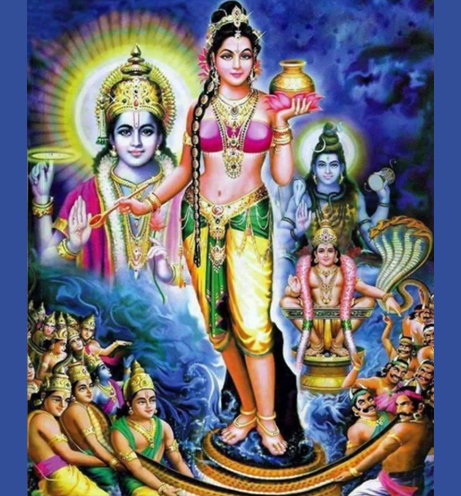NAME 92
Vyālaḥ व्यालः
Vyāla means snake. This nāma is used in the sense that He is beyond reach. Generally serpents are difficult to catch, without expertise. He eludes those who are not devout to Him.
Probably this nāma is used to indicate the power of kuṇḍalini, the life force. Kuṇḍalin also means snake. Kṛṣṇa has made a subtle reference to the power of kuṇḍalini in Bhagavad Gītā by referring to the third eye or ājñā cakra. He says that at the time of death one should fix his consciousness at ājñā cakra and think about Him, to attain liberation. The merger of individual consciousness with Supreme Consciousness is liberation.
*Bhagavan is Vyala because He is slippery like a serpent to grasp, or beyond grasp like a huge elephant. Vyala also means ‘Serpent’; to those who have no devotion or understanding, God or Truth is as horrible and terrible as a ‘serpent’. Moreover, it is so difficult to grasp in our understanding that It is like a serpent: ever eluding, always slippery.
Vyaalah – One who cannot be easily Grasped
Vyaala is a name commonly used to denote a snake, a tiger or an elephant. What is common to these 3 is their elusiveness. The snake is elusive because of its slipperiness, the tiger because of its ferocity and the elephant because of its size.
Sri Adi Sankara says ‘Vyaalavat graheetum Ashakyatvaat Vyaalah – Bhagavan is Vyaala because He is slippery like a serpent to grasp, or beyond grasp like a huge elephant. Or He is impossible to be controlled by the demons, like a ferocious tiger.
BG 11.52-53:
श्रीभगवानुवाच |
सुदुर्दर्शमिदं रूपं दृष्टवानसि यन्मम |
देवा अप्यस्य रूपस्य नित्यं दर्शनकाङ्क्षिण: || 52||
नाहं वेदैर्न तपसा न दानेन न चेज्यया |
शक्य एवंविधो द्रष्टुं दृष्टवानसि मां यथा || 53||
śhrī-bhagavān uvācha
su-durdarśham idaṁ rūpaṁ dṛiṣhṭavān asi yan mama
devā apy asya rūpasya nityaṁ darśhana-kāṅkṣhiṇaḥ
nāhaṁ vedair na tapasā na dānena na chejyayā
śhakya evaṁ-vidho draṣhṭuṁ dṛiṣhṭavān asi māṁ yathā
BG 11.52-53: The Supreme Lord said: This form of mine that you are seeing is exceedingly difficult to behold. Even the celestial gods are eager to see it. Neither by the study of the Vedas, nor by penance, charity, or fire sacrifices, can I be seen as you have seen me.
Commentary
Having shown Arjun the cosmic form, and having praised it as being unavailable to anyone but him, Shree Krishna does not want him to slacken his love for the personal form of God. Hence, Shree Krishna says that the way in which Arjun sees God is exceedingly rare. He emphasizes that even the celestial gods yearn to realize God in his two-armed personal form as he is standing before Arjun. This is not possible by any amount of Vedic studies, austerities, or fire sacrifices. The basic spiritual principle is that God cannot be known by the strength of one’s efforts. However, those who engage in devotion to him become recipients of his grace. Then, by virtue of his grace, they are easily able to know him. The Muṇḍakopaniṣhad states:
nāyamātmā pravachanena labhyo na medhayā na bahunā śhrutena (3.2.3)[v26]
“God cannot be known either by spiritual discourses or through the intellect; nor can he be known by hearing various kinds of teachings.” If none of these means can help realize God in his personal form, then how can he be seen in this manner? He now reveals the secret.
९२. ॐ व्यालाय नमः |
92. OM Vyālāya Namaḥ
Vyaalah -One who is unapproachable. Vyaala also means ‘Serpent’; to those who have no devotion or understanding, God or Truth is as horrible and terrible as a ‘serpent’. Moreover, it is so difficult to grasp in our understanding that It is like a serpent: ever eluding, always slippery.
Aśakyatvād grahītuṃ taṃ vyālavadvāla ucyate / अशक्यत्वाद् ग्रहीतुं तं व्यालवद्वाल उच्यते So called as He cannot be grasped (by the mind) as a serpent which cannot be grasped (by the hand).
Bhagavad Gītā – Chapter 11
Nāhaṃ vedairna tapasā na dānena na cejyayā,
Śakya evaṃvidho draṣṭuṃ dr̥ṣṭavānasi māṃ yathā. (53)
:: श्रीमद्भगवद्गीता – विश्वरूपसंदर्शन योग ::
नाहं वेदैर्न तपसा न दानेन न चेज्यया ।
शक्य एवंविधो द्रष्टुं दृष्टवानसि मां यथा ॥ ५३ ॥
Not through the Vedas, not by austerity, not by gifts, nor even by sacrifice can I be seen in this form as you (Arjuna) have seen Me.
INTERPRETATION GUIDED BY SANT VANI (WORDS OF SAINTS)
Vyālaḥ
The one who cannot be caught hold of.
A tiger, a rogue elephant, venomous snakes and also wicked people are indicated by the word vyāla. All these cannot be easily caught and tamed. That this nāma occurs after ahaḥ and samvatsara, which also imply time, is significant.The Lord too is difficult to catch like a vyāla, He is nown as Vyāla.
What may strike unexpectedly and cannot be easily caught and tamed is time. We often say that Time does not wait for anyone. For each person in this world, a day is of 24 hours. The duration of the day and night may be different. Still, Time has its dance and ebbs away.
If we want to live a life with minimum regrets, then we recognise the role of time in our lives, relatively speaking. Most of us resist the manifestation of time and the effects of time. We resist ageing, the end of a vacation, the changes that happen in our lives as time goes by. Children want to grow up quickly and are waiting for time to zip by. Adults wish they could rewind to their childhood and wonder what was the hurry in trying to grow up and wish that time moved slowly.
Some of us take time for granted; time will always be available to pursue the things I want, spend time with the people I like, enjoy myself. What‘s wrong with today? Why can‘t I do what can be done today? Doing what needs to be done, implies being responsible for my actions, not blaming myself or others and that feels difficult for most of us. We are not used to it. Does not matter. I can get used to what needs to get done. Why? Because it is important. Because I am important, in my life.
If the present moment is all I have and I am clear about my priorities in life, then no day is a waste. If I am clear about my priorities, (the need behind the need) in the following areas of my life: physical, emotional, intellectual, social and spiritual, then I work towards it every day, in the way it is possible. Every day is a successful day because it contributes to my priorities and my identified priorities are what makes me happy and fulfilled. All days contribute to my emotional maturity and objectivity, if that is what I really want. And if Yama knocks on my door, I need not be dragged screaming and resisting. Each day is complete in and of itself.
He, who cannot be easily grasped and is as elusive and slippery as a serpent. Difficult to hold on to (like a rogue elephant. (Śaṅkara) He who accepts and protects his devotees. (Parāsara Battar)
While it is true that Viṣṇu is compassionate and all embracing and accepting of his devotees, it is also true that he is very demanding and extremely difficult to hold on to (as this name suggests). Just as when Viṣṇu became Mohinī and kept slipping out of the grasp of the Asurās. At the same time, few can stay away from the ākṛṣṇa of Viṣṇu or Kṛṣṇa or Rāma.
PLEASE WATCH 1.45.21min to 1.55.19min
The greatest example of this ākṛṣṇa is the rāsa-līlā episodes of the Śrīmad Bhāgavatam where the Gopis are so immersed and completely identified with Kṛṣṇa that they can’t bear his separation even for a moment and run around searching for him like mad women asking the trees and the leaves about his whereabouts. It is said that they were like lovelorn cow-elephants who had lost their lead-tusker. But, why did Kṛṣṇa who was always with them suddenly disappear? He disappeared as soon as pride, possessiveness, and self-importance entered the hearts of the Gopis. He is like that – all attractiveness and compassion but still slippery – he will give all but also take all – that is Viṣṇu and therefore he is Vyālaḥ. Reproduced below are excerpts from the Śrīmad Bhāgavatam[1] that capture the mood of the Gopis when their Kṛṣṇa disappeared from their midst. This is how it feels to be disconnected from the one who is the in-dweller in all beings. It is rāsa because it is the purest essence of all essences the ultimate consummation of the Ātman in the Paramātman:
The Gopis on noticing that Kṛṣṇa had suddenly vanished from their midst became distressed as the cow-elephants in a herd would be when their leading tusker is gone. These women, their minds powerfully attracted and fully absorbed in the varied activities of the lord – his gait, his love, his attractive conversation, and his various sportive activities – felt a sense of identification with him and assumed his ways and attitudes. Those beloved ladies of Kṛṣṇa felt so attracted… that they felt themselves to be one with him and imitated his sportive ways and declared themselves to be Kṛṣṇa. Singing loudly, they moved from forest to forest in a body in search of Kṛṣṇa like demented persons. They inquired of forest trees the whereabouts of that all-pervading being who is within and without all entities like the ākāśa…
Speaking thus in the fashion of demented persons ad engaged in an exhausting search for Kṛṣṇa, the Gopis got so much identified in consciousness with him that they began to enact the various sportive performances of his infancy. One woman acted as Putāna while another taking the role of Kṛṣṇa sucked at her breasts. Another impersonating the crying infant Kṛṣṇa kicked the one who played the part of the cart. Identifying herself with the wind-demon, one Gopi carried away another standing for Kṛṣṇa. Still another began to move about like baby Kṛṣṇa on knees and hands, filling the place with murmur of mini-bells on girdles and anklets. Two of them impersonated Rāma and Kṛṣṇa and some others the cowherd boys and calves. Enacting the sports of Kṛṣṇa one got ‘killed’ as Vatsāsura and another as Bakāsura. One impersonating Kṛṣṇa called back from a distance the cattle that had strayed away… One played on the flute and frolicked, while others watched the play and cried out in appreciation. In complete identification with Kṛṣṇa one put her hand on the shoulder of another and walked about saying: “I am Kṛṣṇa. See my charming gait! Do not have any fear of wind and rain. I give you protection from it! – so saying, one woman lifted up her upper garment with great effort as if she was holding aloft Govardhana mountain. Another, in identification with the Kaliya episode, got on the head of another and said: “O evil one! Go away from here. I am born to punish the wicked. I shall give you relief immediately…”
There is much more as part of the episode but it shows what it means to be in the coils of that Vyālaḥ and what it means to lose him…
There is not a line here that can be written or read without eyes blurring and shivers running down the body – such is the purity and essence of the Bakthi of the Gopis and even from them Kṛṣṇa could slip away…
Note
1. Srimad Bhagavata, The Holy Book of God. Volume Three, Translated by Swami Tapasyananda. Sri Ramakrishna Math



